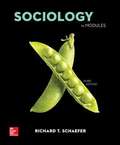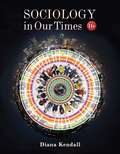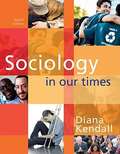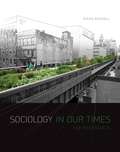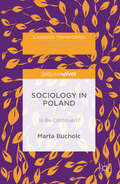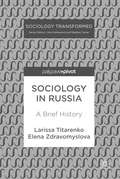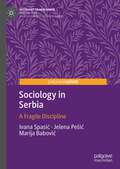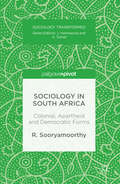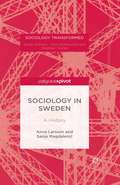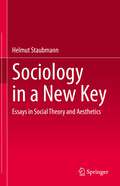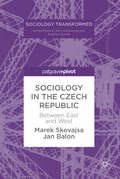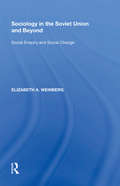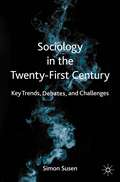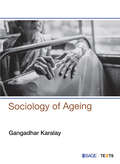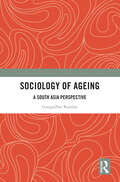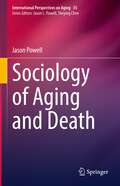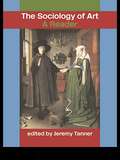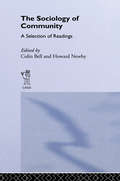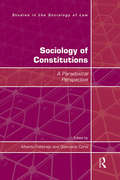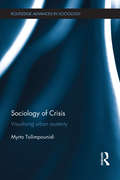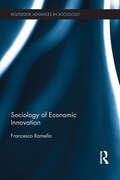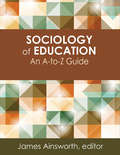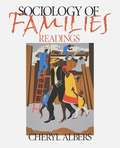- Table View
- List View
Sociology in Modules
by Richard T. SchaeferSociology in Modules takes a traditional approach to Introduction to Sociology―while presenting material in a flexible way that allows instructors to select and organize reading assignments in the best order for their course.
Sociology in Modules, Third Edition
by Richard T. SchaeferSociology in Modules adapts to the classroom and students by utilizing a flexible teaching format. It allows instructors to choose the content they know and trust and present it in a layout that students can manage. Its proven online experience adapts to students' learning needs, enhancing the understanding of the topics and developing their sociological imagination. Connect is the only integrated learning system that empowers students by continuously adapting to deliver precisely what they need, when they need it, and how they need it, so that your class time is more engaging and effective.
Sociology in Our Times
by Diana KendallKendall's text is acclaimed in the field for its integration of race, class, and gender issues as well as its thorough presentation of sociological theory, which includes diverse theoretical viewpoints such as feminist and postmodernist theory. A social issue or application opens each chapter and provides various topics for boxes, features, and examples that are carried throughout the entire chapter. The author's vivid, applied, personal writing style engages students, and activates compelling everyday examples that make sociology particularly relevant to diverse students. This cutting-edge, applied book highlights the relevance of sociology by including a diverse collection of theories, research, and lived experiences that accurately mirror the diversity in society itself. Kendall shows students that sociology involves important questions and issues that they confront both personally and vicariously.
Sociology in Our Times
by Diana KendallWhat would you like to know more about in the social world where you live? As you know, we face unprecedented challenges and opportunities in the twenty-first century. By gaining new sociological insights on pressing social issues
Sociology in Our Times (8th edition)
by Diana KendallIncorporating both classical and contemporary theory, this textbook introduces the sociological perspective and research process, describes the relationships among the different social institutions, and examines social groups, control, differences, inequality, dynamics, and change.
Sociology in Our Times: The Essentials, Tenth Edition
by Diana KendallThis edition presents the latest available data and new insights on behaviors, beliefs, issues, and trends in our nation and world from a sociological perspective. The author humanizes sociology with real-life stories, told by the people who have lived them, and timely topics such as health care legislation, the U.S. and global economies, environmental activism, immigration, bullying and social media, high-tech employer "spying" on workers, gun control, same sex-marriage, and establishing policies on how to prevent military suicides.
Sociology in Poland
by Marta BucholcThis ground-breaking book provides a compelling account of the social sciences in post-war Central and Eastern Europe. The first English-language monograph to analyse the history of sociology in Poland up to the present day, it maps transformations in the discipline against political and social change. Related in an accessible and engaging manner, it offers a comprehensive examination of sociology as a part of Polish society and culture after 1945. It can also be used as an introduction to the subject and a guide to further reading. Part of the influential Sociology Transformed series, Sociology in Poland will interest social and political scientists, historians and policymakers.
Sociology in Russia
by Larissa Titarenko Elena ZdravomyslovaThis book represents the first comprehensive historical treatment of sociology in Russia from the mid-nineteenth century through the pre-revolutionary and Soviet eras to the present day. It sheds new light on the dramatic history of sociology in the Russian context; dramatic both in its relationship with state power, and in the large-scale societal transformations it has had to grapple with. The authors highlight several particularities including the late institutionalization of sociology in the Soviet period, the breaks in continuity between its main historical periods and the relationship between sociology and power throughout its history. This valuable work will appeal to social science and history scholars, as well as readers interested in the history of contemporary Russia.
Sociology in Serbia: A Fragile Discipline (Sociology Transformed)
by Ivana Spasić Jelena Pešić Marija BabovićThis book represents the first comprehensive century-long history of the disciplinary development of sociology in Serbia in English. It provides an overview of the constitution of sociology as an academic discipline during the interwar period, its reinstitutionalization after World War II in entirely new social circumstances marked by establishment of self-management socialism in Yugoslavia, and finally its development during the turbulent postsocialist period. Divided into five chapters, the focus of the book is on the challenges that sociology has faced in order to maintain its institutional position, gain adequate social recognition, and preserve its professional autonomy. Relying on Bourdieu's concept of the academic field and Burawoy's typology of Professional, Critical, Public and Policy sociology, the book seeks to answer the question of how the sociological academic field in Serbia has been constituted, structured and restructured, and in which of these roles sociology has dominantly appeared in different phases of its evolution.
Sociology in South Africa
by R. SooryamoorthyThis book is the first comprehensive account of the history and current state of South African sociology. Providing a holistic picture of the subject both as it is taught in universities and as a field of research, it reveals the trajectories of a discipline in a challenging socio-political context. With the support of historical and scientometric data, it demonstrates how the changing political situation, from colonialism to apartheid to democracy, has influenced the nature, direction and foci of sociological research in the country. The author shows how, during the apartheid era, sociology was professionally fragmented and divided along language and race lines. It was, however, able to flourish with the advent of democracy in 1994 and has become a unique academic movement. This insightful work will appeal to students and scholars of the social sciences, and all those interested in the history and society of South Africa.
Sociology in Sweden: A History (Sociology Transformed)
by Anna Larsson Sanja Magdaleni?This book offers a brief but comprehensive overview of the history of sociology in Sweden from the prewar period to the present day. It focuses in particular on scientific boundaries, gender and the relationship between sociology and the Swedish welfare state.
Sociology in a New Key: Essays in Social Theory and Aesthetics
by Helmut StaubmannThis book presents essays that address fundamental issues in social and cultural theory by viewing them through the lens of aesthetic theory. Drawing on the aesthetic theories of Theodor W. Adorno, Gregory Bateson, Jean-Marie Guyau, Talcott Parsons and Georg Simmel, it suggests a new take on basic sociological concepts and methodologies. The chapters cover a wide range of topics, including the sensuality of social action, social construction of unreality, and The Rolling Stones’ enduring success as a reflection of our society and culture. The book’s title Sociology in a New Key refers to a classic work by Susanne K. Langer, whose Philosophy in a New Key argued for a reorientation of modern philosophical thought based on a thorough account of symbolism in general and of the arts in particular. In this way, the basic ideas and assumptions of the philosophical tradition are transposed to new understandings and perspectives. After all, it was Georg Simmel himself who claimed to have gained several of his general theoretical insights “via the detour of reflections on the essence of art.” The book will appeal to scholars and students of the sociology of the arts and music, and to anyone interested in the intersection of social theory and aesthetics.
Sociology in the Czech Republic
by Marek Skovajsa Jan BalonThis book offers the first comprehensive overview in English of the history of sociology in what is today the Czech Republic. Divided into six chapters, it traces the institutional development of the discipline from the late 19th century until the present, with an emphasis on the periods most favorable for sociology's institutionalization: the interwar years, the 1960s and the post-1989 era. The narrative places the institutions, persons and ideas that have been central to the discipline into the broader social and political context. Marek Skovajsa and Jan Balon show that sociology in the Czech Republic has been wedded to the dominant political projects of each successive historical period: nation- and state-building until after WWII, the communist experiment in 1948-1989, liberal democratic reconstruction after 1989, and internationalization after 2000. This work will appeal to social scientists and to a general readership interested in Czech culture and society.
Sociology in the Soviet Union and Beyond: Social Enquiry and Social Change
by Elizabeth A. WeinbergThis fascinating and comprehensive volume traces the development, scope and character of sociological research in Russia and subsequently the Soviet Union from the turn of the 20th century to the 1990s. Opening with the lively social debates of pre-Revolution Russia, Elizabeth Weinberg discusses the intellectual factions of the post-Revolutionary period and the eventual replacement of 'idealism' with 'materialism', leading to the emergence of Soviet sociology in 1956. The book examines the methods of research that were accepted as valid for Marxist research, offering a profile of key Soviet sociologists and the research climate in which they operated. It also discusses the main areas of research that predominated in Soviet sociology, with separate chapters on two of the most significant: public opinion research and time-budget studies. This fully revised, newly updated edition of The Development of Sociology in the Soviet Union concludes with a discussion of the involvement of Soviet sociologists in the processes of perestroika and glasnost, and the changing position of sociology from the late 1980s onwards.
Sociology in the Twenty-First Century: Key Trends, Debates, and Challenges
by Simon SusenThis book examines key trends, debates, and challenges in twenty-first-century sociology. To this end, it focuses on significant issues surrounding the nature of sociology (‘What is sociology?’), the history of sociology (‘How has sociology evolved?’), and the study of sociology (‘How can or should we make sense of sociology?’). These issues have been, and will continue to be, essential to the creation of conceptually informed, methodologically rigorous, and empirically substantiated research programmes in the discipline. Over the past years, however, there have been numerous disputes and controversies concerning the future of sociology. Particularly important in this respect are recent and ongoing discussions on the possibilities of developing new – and, arguably, post-classical – forms of sociology. The central assumption underlying most of these projects is the contention that a comprehensive analysis of the principal challenges faced by global society requires the construction of a sociology capable of accounting for the interconnectedness of social actors and social structures across time and space. This book provides a cutting-edge overview of crucial past, present, and possible future trends, debates, and challenges shaping the pursuit of sociological inquiry.‘Simon Susen – one of the most knowledgeable scholars in the contemporary social sciences – examines the key challenges with which sociology is confronted today. This book is a must-read for professional sociologists as well as for those studying the subject.’ – Luc Boltanski, École des Hautes Études en Sciences Sociales, Paris, France‘Simon Susen provides a balanced update on sociology’s theoretical, methodological, and institutional resources as well as challenges in today’s complicated local and global social worlds. Fortunately, he has innovative and practical recommendations for ensuring the cutting-edge relevance of sociological thinking. This book is an excellent choice for undergraduate and postgraduate students as well as for the general reader.’ – Sandra Harding, University of California, Los Angeles, USA ‘A comprehensive and judicious account of the intellectual and material state of sociology, based on omnivorous reading and incisive analysis. The writing is beautifully clear, and the book is a major contribution to the self-understanding of the discipline.’ – William Outhwaite, Newcastle University, UK
Sociology of Ageing
by Gangadhar KaralayA comprehensive textbook that provides an invaluable introduction to the major issues involved in the study of ageing from a sociological perspective. Sociology of Ageing seeks to analyse the biological, psychological and sociocultural aspects of ageing problems in India. Spanned over 13 chapters, the textbook extensively covers theoretical and demographic perspectives on ageing, social dimensions, social support, and state policies. It describes the challenges faced by the elderly and avenues of opportunities available to them to remain actively engaged in life. This textbook widely refers to research works beyond the disciplinary boundary of sociology to help develop a lucid yet critical understanding of sociological ageing. This textbook will be of interest to the students of sociology, gerontology, health and social care, and professionals working with older people. Key Features: • First-of-its-kind textbook focused on the Indian context • Highlights variability and diversity in ageing processes • Provides a holistic understanding of each topic • Each chapter aided by insightful pedagogical features such as learning outcomes, key terms and points for classroom discussion
Sociology of Ageing: A South Asia Perspective
by Gangadhar KaralayThis book examines the biological, psychological, and sociocultural aspects of challenges related to ageing in India. It does so by widely referring to research works beyond the disciplinary boundary of sociology to help develop a lucid yet critical understanding of sociological ageing.Apart from providing an invaluable introduction to the major issues involved in the study of ageing from a sociological perspective, this book discusses demographic perspective, social dimensions, social support, and state policies in detail. It aptly describes challenges faced by elderly people and avenues of opportunities available to them to remain actively engaged in life.This book would be useful to the students, researchers and teachers of Sociology, Social Work, Public Health and Psychology. It would also be an invaluable companion to professionals working in the field of Gerontology, Health and Social care, and NGOs working with older people.
Sociology of Aging and Death (International Perspectives on Aging #35)
by Jason PowellThis book presents a critical analysis and examination of the major theories and social issues in the social construction of aging and death. It is concerned with the impact of death and places how our experiences of death are transformed by the roles that truth and discourse about aging play in everyday life. A major element of the book is an examination of the way in which groups and individuals employ specific representations of mortality in order to construct meaning and purpose for life and death. To accentuate this, the book provides an investigation into the social construction of death practices across time and space. Special attention is given to the notion of death as a socially accomplished phenomenon grounded in a unique sociological introduction to the meaning of death throughout history to the present. The purpose of this book is to critically inform debates concerning the abstract and empirical features of death examined through the lens of sociological perspectives. This book explores the emergent biomedical dominance relating to ageing and death. An alternative is advocated which re-interprets ageing for Graduate schools. This innovative book explores the concept, history and theory of aging and its relationship to death. Traditionally, many books have focused on older people dying of 'natural causes', a biomedical explanatory framework. This book looks at alternative social theories and experiences with aging and relate to death in different countries, victims, crime, imprisonment and institutional care. Are these deaths avoidable? If so, what are the solutions the book addresses. This is one of the first books that re-interprets aging and its relationship of examples of death. It will be of essential reading for graduate students and researchers in understanding these different examples of aging and death across the globe.
Sociology of Art: A Reader
by Jeremy TannerIntroducing the fundamental theories and debates in the sociology of art, this broad ranging book, the only edited reader of the sociology of art available, uses extracts from the core foundational and most influential contemporary writers in the field. As such it is essential reading both for students of the sociology of art, and of art history. Divided into five sections, it explores the following key themes: * classical sociological theory and the sociology of art * the social production of art * the sociology of the artist * museums and the social construction of high culture* sociology aesthetic form and the specificity of art. With the addition of an introductory essay that contextualizes the readings within the traditions of sociology and art history, and draws fascinating parallels between the origins and development of these two disciplines, this book opens up a productive interdisciplinary dialogue between sociology and art history as well as providing a fascinating introduction to the subject.
Sociology of Community: A Collection of Readings
by Colin Bell Howard NewbyFirst Published in 1974. Routledge is an imprint of Taylor & Francis, an informa company.
Sociology of Constitutions: A Paradoxical Perspective (Studies in the Sociology of Law)
by Giancarlo Corsi Alberto FebbrajoThis collection brings together some of the most influential sociologists of law to confront the challenges of current transnational constitutionalism. It shows the constitution appearing in a new light: no longer as an essential factor of unity and stabilisation but as a potential defence of pluralism and innovation. The first part of the book is devoted to the analysis of the concept of constitution, highlighting the elements that can contribute from a socio-legal perspective, to clarifying the principle meanings attributed to the constitution. The study goes on to analyse some concrete aspects of the functioning of constitutions in contemporary society. In applying Luhmann’s General Systems Theory to a comparative analysis of the concept of constitution, the work contributes to a better understanding of this traditional concept in both its institutionalised and functional aspects. Defining the constitution’s contents and functions both at the conceptual level and by taking empirical issues of particular comparative interest into account, this study will be of importance to scholars and students of sociology of law, sociology of politics and comparative public law.
Sociology of Crisis: Visualising Urban Austerity (Routledge Advances in Sociology)
by Myrto TsilimpounidiThe global financial crisis has demonstrated the impact and implications of late capitalism and its bedfellow, globalisation. In the European context, crisis is seen as a threat to the stability of the region, rather than a local or national concern. Post-2008, crisis is social and political, rather than merely financial, as Western countries witness the consequences of consumption, growth and profit. In this book, Tsilimpounidi demonstrates how sociologists must develop new approaches to examining rapid shifts in the social landscape, since crisis is not merely reflected in balance sheets, but is mediated through spectacular imagery of loss, deprivation and increased vectors of marginalisation. Providing focused and valuable insight into the pressing problems of those living in Greece in relation to the wider spheres of the nation and at the level of the European Union, Sociology of Crisis takes an approach that is firmly located within a critical sociological appeal to reflexivity. A timely engagement with the problem of crisis at a macro-level and in dialogue with the everyday experiences of crisis on a micro-level, this interdisciplinary title will appeal to both undergraduate and postgraduate students interested in sociology, social policy, geography, urban studies and research methods (social science).
Sociology of Economic Innovation (Routledge Advances in Sociology)
by Francesco RamellaThis book offers a sociological overview of the theories and research on economic innovation. Over the past few decades, the economics of innovation has given rise to a lively flow of studies, and innovation studies continues to develop as an interdisciplinary field of research. Sociology in general, and economic sociology in particular, have already made a significant contribution to innovation and continue to play a crucial role in this emerging field. This book presents an integrated sociological approach to the study of economic innovation. It explores the key theories and sociological research on innovation, as well as other contributions to the field of Innovation Studies from economists, geographers, and psychologists. Ramella argues that in order to understand the processes of innovation, it is necessary to look at the actors of innovation, at the relations that exist between them and at the sectoral and territorial contexts in which they operate. For students, this book includes international case studies throughout, as well as further study questions at the end of each chapter.
Sociology of Education: An A-to-Z Guide
by James AinsworthThe sociology of education is a rich interdisciplinary field that studies schools as their own social world as well as their place within the larger society. The field draws contributions from education, sociology, human development, family studies, economics, politics and public policy. Sociology of Education: An A-to-Z Guide introduces students to the social constructions of our educational systems and their many players, including students and their peers, teachers, parents, the broader community, politicians and policy makers. The roles of schools, the social processes governing schooling, and impacts on society are all critically explored. Despite an abundance of textbooks and specialized monographs, there are few up-to-date reference works in this area. Features & Benefits: 335 signed entries fill 2 volumes in print and electronic formats, providing the most comprehensive reference resource available on this topic. Cross-References and Suggestions for Further Reading guide readers to additional resources. A thematic "Reader's Guide" groups related articles by broad topic areas as one handy search feature on the e-Reference platform, which also includes a comprehensive index of search terms, facilitating ease of use by both on-campus students and distance learners. A Chronology provides students with historical perspective on the sociology of education.

